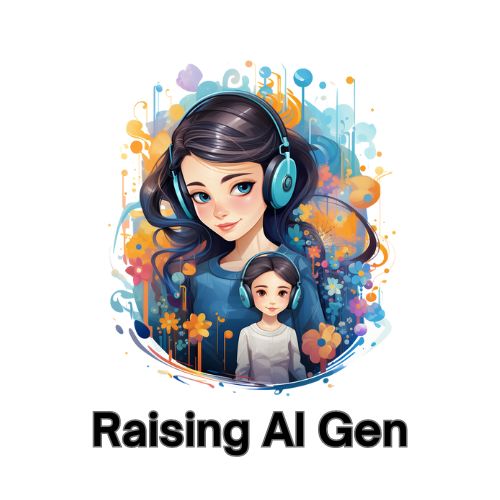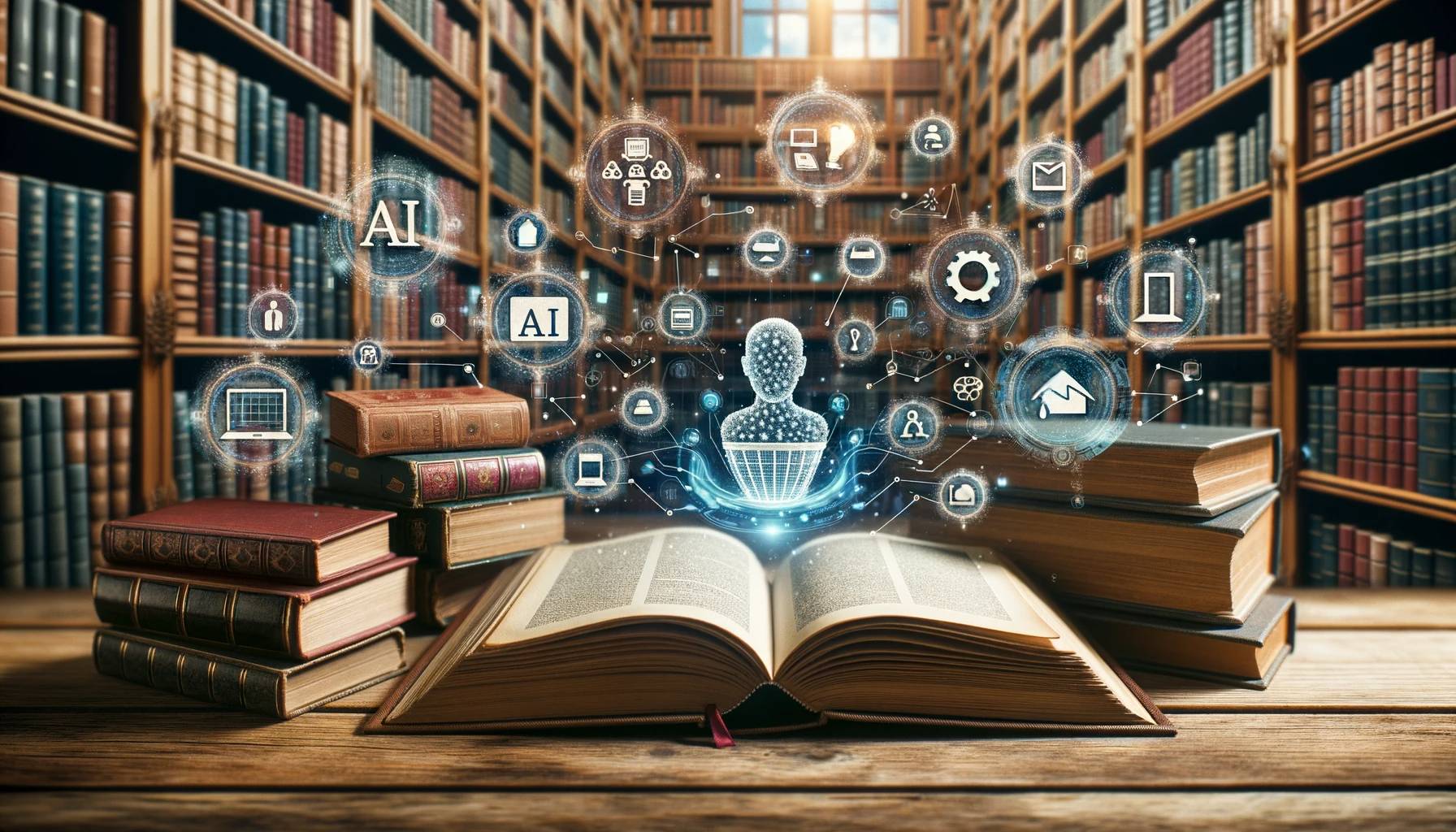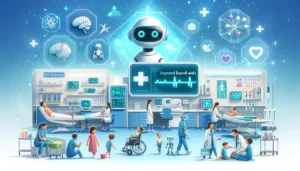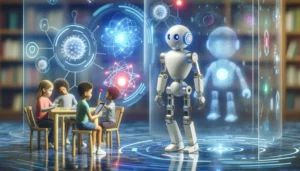Dive into a world where the lines between reality and virtuality blur, as you uncover the boundless potential of AI in education through a selection of meticulously curated AI in Education Books.
Are you ready to unravel the mysteries of how Artificial Intelligence (AI) is reshaping the educational landscape, one algorithm at a time?
Embark on a captivating journey through the pages of insightful books that aim to demystify the complexities of integrating AI in the classroom.
Discover how these books shed light on the transformative power of AI, opening doors to a future where personalized learning is not just a dream, but a reality.
As technology continues to advance at an unprecedented pace, understanding the interplay between AI and education becomes paramount.
The books on AI in education serve as a beacon, illuminating the path for educators, policymakers, and learners, guiding them through the labyrinth of AI-driven educational innovations.
They offer a treasure trove of knowledge, exploring the ethical considerations, practical applications, and the futuristic vision of AI in education.
With every page you turn, you’re one step closer to grasping the essence of how AI can enhance teaching and learning experiences, making education more interactive, personalized, and impactful.
Key Takeaways
Key Points Details Notable Books Delve into a selection of notable books that explore the myriad facets of AI in education, each offering a unique perspective on how AI is revolutionizing the educational domain. Curriculum Design Uncover the insights on how AI necessitates a rethinking of curriculum design to make learning more relevant in the digital age. Practical Applications Discover the practical applications of AI in classrooms as discussed in the books, and how they contribute to enhanced teaching and learning experiences. Ethical Considerations Explore the ethical considerations surrounding AI in education as highlighted in the books, shedding light on the responsible integration of AI in educational settings. Future Trends Get a glimpse into the future of AI in education as projected by various authors in the books, offering a roadmap to the evolving educational landscape powered by AI.
This introduction serves as a springboard into the comprehensive exploration of AI in education through a selection of insightful books.
As you delve deeper into this article, each section will unravel the essence of the discussions encapsulated in these books, providing you with a well-rounded understanding of the subject matter.
Notable Books on AI in Education
The landscape of AI in education is vast and ever-evolving.
Various authors have taken to the pen to share their insights, experiences, and research findings in the form of books.
Here’s a look at some of the notable books that delve into the intricacies of AI in education, shedding light on its potential to revolutionize learning and teaching.
The AI Classroom: The Ultimate Guide to Artificial Intelligence in Education
By Dan Fitzpatrick, Amanda Fox, and Brad Weinstein

This book serves as a comprehensive guide for educators keen on integrating AI into their teaching practices.
It provides a deep dive into the various AI technologies that can be utilized in the classroom, offering practical advice on how to leverage AI for enhanced learning experiences.
- Key Topics Covered:
- Implementation of AI in the classroom
- Ethical considerations in using AI
- Real-world examples of AI enhancing learning
80 Ways to Use ChatGPT in the Classroom: Using AI to Enhance Teaching and Learning
By Dr. Stan Skrabut

A meticulous exploration into the education-relevant AI technology, ChatGPT, this book simplifies complex AI concepts making them accessible to educators.
It presents a comprehensive analysis utilizing ChatGPT to foster engaging and personalized learning experiences.
- Key Topics Covered:
- Impact of ChatGPT on classrooms
- Utilization of ChatGPT in education
- Concerns and Ethical Implications of using ChatGPT
Artificial Intelligence In Education: Promises and Implications for Teaching and Learning
By Wayne Holmes, Maya Bialik, and Charles Fadel
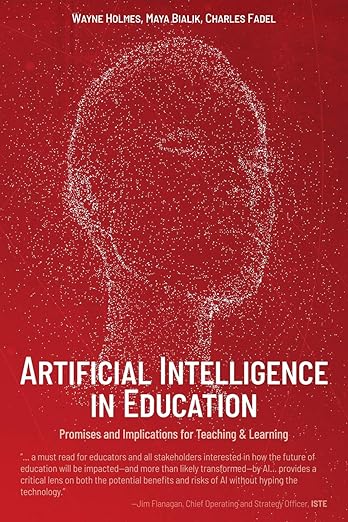
This book aims at empowering educators by exploring the use of AI as a tool to enhance K–12 instruction and administration.
It paints a realistic picture of how the industry and sector will be drastically affected by the presence of artificial intelligence.
- Key Topics Covered:
- Impact of AI on Education
- Curriculum Redesign
- Interdisciplinary Learning
These books collectively contribute to the broader understanding and discussion surrounding AI in education.
Whether you are an educator seeking to introduce AI in your classroom, or a policymaker aiming to draft informed policies, these books offer a plethora of insights to guide you along your journey.
Impact of AI on Curriculum Design
The integration of Artificial Intelligence (AI) in education brings forth the necessity to revamp the traditional curriculum to align with the modern-day technological advancements.
The books discussed in the previous section provide a robust groundwork for understanding how AI can be a game-changer in redesigning curriculum to foster a more engaging and effective learning environment.
Modernizing Content
With AI’s advent, the content of the curriculum requires a fresh outlook to remain relevant and engaging.
AI in education books highlight the importance of updating the content to include AI-related concepts and technologies.
This not only equips students with the knowledge of AI but also prepares them for the digital future.
Moreover, AI can be utilized to create dynamic curriculum content that adapts to individual learners’ needs, making learning more personalized and effective.
Focusing on Core Concepts
The books emphasize the significance of focusing on core concepts rather than rote memorization.
AI can automate the grading process, allowing educators to focus more on teaching core concepts and fostering critical thinking and problem-solving skills among students.
This shift is crucial in preparing students for real-world challenges.
Embedding Interdisciplinary Themes
Interdisciplinary learning is another key aspect discussed in the books.
They advocate for a curriculum that embeds interdisciplinary themes, promoting a holistic learning experience.
AI can facilitate interdisciplinary learning by providing a platform for integrating various subjects and promoting collaborative learning.
Practical Applications of AI in Classrooms
The technological advancements in Artificial Intelligence (AI) are not merely theoretical discussions; they have practical applications that are revolutionizing classrooms as we know them.
The books discussed shed light on various ways AI can be employed in educational settings to enhance both teaching and learning experiences.
Below are some of the practical applications discussed in these books:
Adaptive Learning Environments
Creating adaptive learning environments is one of the significant applications of AI in education.
AI can analyze student performance data to identify learning gaps and adapt the curriculum to meet individual learning needs.
This personalized approach enhances the learning experience, making education more effective and enjoyable.
- Benefits:
- Personalized learning paths.
- Improved engagement and retention.
- Prompt feedback for both educators and learners.
Automated Administrative Tasks
AI can automate a variety of administrative tasks, freeing up educators’ time to focus more on teaching.
From grading assignments to managing schedules, AI can handle these routine tasks efficiently.
- Benefits:
- Time-saving.
- Increased efficiency in administrative processes.
- More time for educators to engage with students.
Virtual Learning Assistants
The integration of virtual learning assistants in classrooms is another practical application of AI.
These AI-driven assistants can provide additional learning materials, answer students’ questions, and offer personalized support outside of classroom hours.
- Benefits:
- Extended learning support.
- Immediate response to queries.
- Enhanced self-directed learning.
| Traditional Classroom Settings | AI-Integrated Classrooms |
| Teacher-centered instruction: The teacher is the primary source of information and guidance. | Student-centered instruction: AI can be used to personalize learning and provide students with the support they need to succeed. |
| Limited feedback: Students may not receive feedback on their work until after it has been graded. | Immediate feedback: AI can provide students with immediate feedback on their work, so they can identify and correct their mistakes as they go. |
| One-size-fits-all approach: All students are taught the same material at the same pace. | Personalized learning: AI can be used to personalize learning for each student, based on their individual needs and interests. |
| Limited assessment data: Teachers may rely on tests and quizzes to assess student learning. | Comprehensive assessment data: AI can track student progress over time and provide teachers with a more comprehensive view of student learning. |
Ethical Considerations
The incorporation of Artificial Intelligence (AI) in education isn’t a straightforward pathway; it’s intertwined with ethical considerations that need meticulous attention.
The books under discussion provide a balanced perspective on the ethical implications surrounding the use of AI in education.
Let’s delve into some of these considerations.
Data Privacy
AI technologies in education often require the collection and analysis of vast amounts of data.
Ensuring the privacy and security of this data is paramount to maintain the trust and safety of all stakeholders involved.
- Key Concerns:
- Unauthorized access to sensitive data.
- Misuse of data by third parties.
- Data breaches and their repercussions.
Bias and Fairness
AI systems are trained on data, and if this data contains biases, the AI system will perpetuate these biases.
Ensuring fairness and avoiding biases in AI applications in education is crucial for equitable learning experiences.
- Key Concerns:
- Discriminatory biases against certain demographics.
- Misrepresentation or underrepresentation of certain groups.
- Ensuring fairness in AI-driven assessments and evaluations.
Transparency and Accountability
Understanding the workings of AI systems and who is accountable for the decisions made by these systems is vital for maintaining ethical integrity in educational settings.
- Key Concerns:
- Lack of transparency in AI decision-making processes.
- Determining accountability for AI-driven decisions.
- Ensuring educators, students, and parents have a clear understanding of AI applications in education.
Ethical Literacy
Equipping educators, students, and stakeholders with the knowledge and understanding of ethical considerations in AI is essential.
Ethical literacy ensures responsible AI usage and fosters a culture of ethical consideration in AI-driven educational settings.
These ethical considerations are vital to ensure that the integration of AI in education is conducted responsibly and equitably.
The books discussed provide a profound understanding of these ethical considerations and propose thoughtful reflections on navigating the ethical landscape of AI in education.
As AI continues to permeate the educational sector, addressing these ethical considerations head-on is imperative to ensure a just and inclusive learning environment.
Future Trends
The trajectory of Artificial Intelligence (AI) in education is on an upward trend, with numerous possibilities and pathways unfolding.
The books highlighted in this article offer a glimpse into the future trends of AI in education, providing a roadmap for educators and policymakers to navigate this evolving landscape.
Here are some of the trends discussed in these books:
Personalized Learning at Scale
One of the most promising trends is the scaling of personalized learning.
AI has the potential to tailor the learning experience to meet the unique needs of each student, even in large classroom settings or online platforms.
- Key Aspects:
- Adaptive learning pathways.
- Personalized feedback and assessments.
- Customized learning resources.
Real-Time Analytics and Interventions
With AI, real-time analytics can provide immediate insights into student performance, allowing for timely interventions to enhance learning outcomes.
- Key Aspects:
- Predictive analytics for early identification of learning gaps.
- Real-time feedback for students and educators.
- Data-driven decision-making in education.
Lifelong Learning and Continuous Skill Development
The future holds a shift towards fostering lifelong learning and continuous skill development, enabled by AI’s ability to provide ongoing, personalized education opportunities.
- Key Aspects:
- AI-facilitated lifelong learning platforms.
- Continuous skill assessment and development.
- Upskilling and reskilling in response to evolving job market demands.
Bridging The Book Covers
As we close the chapter on this exploration of AI in Education Books, it’s evident that the melding of AI and education is a narrative filled with promise, intrigue, and requisite caution.
Through the lens of these insightful books, we’ve traversed the realms of practical AI applications in classrooms, delved into the ethical labyrinths, and peeked into the future of AI-augmented education.
The books discussed serve as a compass, guiding educators, policymakers, and learners through the complex yet exhilarating landscape of AI in education.
They not only demystify AI but beckon a call to action to embrace the transformative power of AI in reshaping education for the better.
The journey doesn’t end here; it’s merely a stepping stone towards a future where education and AI go hand in hand, each enhancing the other to create a conducive learning environment.
As AI continues to evolve, staying informed through such resourceful books and engaging in discussions like those found on RaisingAIGen will undoubtedly propel us towards an education system that’s more personalized, inclusive, and adept at preparing the future generations for the digital era.
The key takeaways table provided at the beginning of this article encapsulates the essence of our exploration, offering a succinct overview of the vital points discussed.
The journey of AI in education is an ongoing narrative, and these books provide a solid foundation for anyone keen on delving deeper into this riveting subject matter.
So, as you turn the pages of these books, may you find inspiration, knowledge, and a vision for the boundless possibilities that AI holds for education.
Frequently Asked Questions for AI in Education Books
Here’s a compilation of frequently asked questions regarding AI in Education Books and the broader context of AI in education:
| Question | Answer |
| What are some notable books on AI in education? | Some notable books include “The AI Classroom: The Ultimate Guide to Artificial Intelligence in Education”, “80 Ways to Use ChatGPT in the Classroom: Using AI to Enhance Teaching and Learning”, and “Artificial Intelligence In Education: Promises and Implications for Teaching and Learning”. |
| How is AI impacting curriculum design? | AI is facilitating the modernization of content, focusing on core concepts, embedding interdisciplinary themes, and bringing in discussions on ethical implications into the curriculum. |
| What are the practical applications of AI in classrooms? | Practical applications include creating adaptive learning environments, automating administrative tasks, and integrating virtual learning assistants for extended learning support. |
| What are the ethical considerations in using AI in education? | Ethical considerations encompass data privacy, avoiding biases to ensure fairness, promoting transparency and accountability, and fostering ethical literacy among all stakeholders. |
| What future trends are anticipated in AI in education? | Future trends include scaling personalized learning, leveraging real-time analytics for timely interventions, promoting lifelong learning and continuous skill development, and fostering a culture of ethical and responsible AI use. |
| How can I learn more about AI in education? | Reading books on AI in education, engaging in online courses, participating in forums and discussions, and exploring articles and resources on platforms like RaisingAIGen are great ways to learn more about AI in education. |
| Are there any ethical concerns about AI in education? | Yes, ethical concerns include data privacy, bias and fairness, transparency and accountability, and ensuring ethical literacy among educators and students. |
| How can educators prepare for the integration of AI in education? | Educators can prepare by upskilling themselves through reading books, attending workshops and courses on AI, and engaging in communities and discussions centered around AI in education. |
